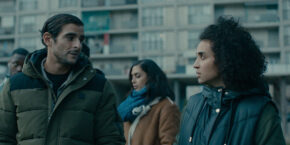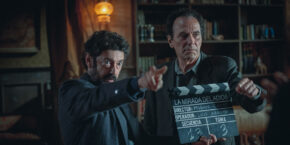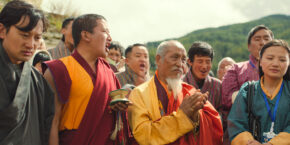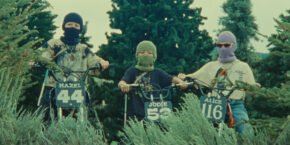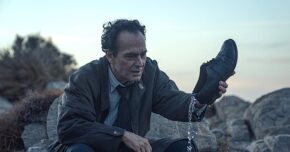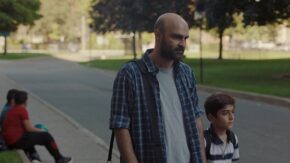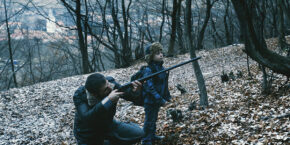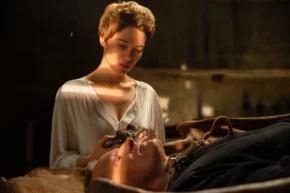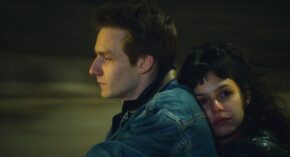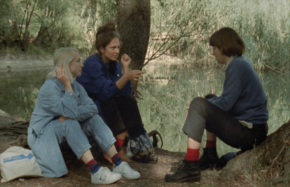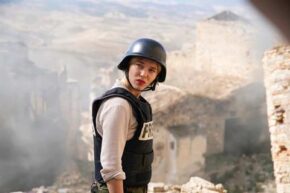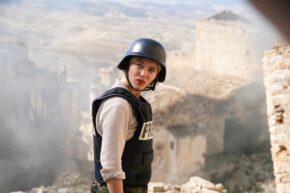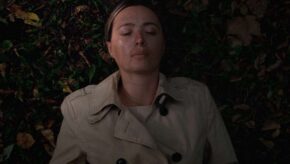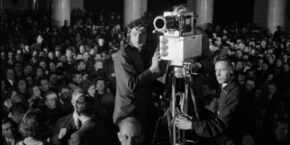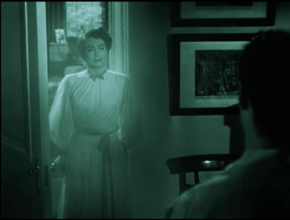Lawrence Garcia
The Sense of the Past: Terence Davies (1945–2023)
By Lawrence Garcia | 01/18/2024 | Columns, CS97, Deaths of Cinema, From Cinema Scope Magazine
To describe a film as being “about memory” is almost as cliché as to say that it is “about time.” Few subjects are thought to be more suited to a temporal medium defined by its mechanical recording apparatus. Yet the films of the late Terence Davies are to my mind the rare works actually deserving of such a description.
Read More → TIFF 2023 | After the Fire (Mehdi Fikri, France) — Discovery
By Lawrence Garcia | 09/05/2023 | Cinema Scope Online, TIFF 2023
By Lawrence Garcia The inciting incident of After the Fire is regrettably familiar: the murder of Karim, a 25-year-old Arab man, at the hands of police, in what a news report later calls a “sensitive neighbourhood” of Strasbourg, France. Riots ensue. The police say the cause of death was an epileptic fit, a claim that…
Read More → TIFF 2023 | Close Your Eyes (Víctor Erice, Spain) — Centrepiece
By Lawrence Garcia | 09/05/2023 | Cinema Scope Online, CS95, TIFF 2023
The Cannes Première of Close Your Eyes, Víctor Erice’s first feature since Dream of Light (1992) over three decades ago, was immediately followed by a minor controversy. Conspicuously absent from the film’s screening, Erice published an open letter at El País explaining his reasons for boycotting the festival, namely, a marked lack of communication—and an implicit lack of respect—from Thierry Frémaux and his programming team regarding his film’s inclusion in the Official Selection, not in Competition.
Read More → TIFF 2023 | The Monk and the Gun (Pawo Choyning Dorji, Bhutan/France/USA/Taiwan) — Centrepiece
By Lawrence Garcia | 09/05/2023 | Cinema Scope Online, TIFF 2023
By Lawrence Garcia The Godardian dictum that all you need to make a movie is a girl and a gun was never intended to be a model of plot construction. Whatever it meant to Griffith, to whom Godard attributed the phrase, it could not, for the latter, stand as a mere formula. Indeed, what films…
Read More → TIFF 2023 | Riddle of Fire (Weston Razooli, US) — Midnight Madness
By Lawrence Garcia | 09/05/2023 | Cinema Scope Online, TIFF 2023
Despite the changes that Cahiers du Cinéma has undergone over the years, its legacy still carries some critical authority—enough, at least, that its apparent endorsement of Weston Razooli’s debut feature, Riddle of Fire, which graced the cover of its Cannes issue back in May, was enough to convince me to see the film.
Read More → Close Your Eyes (Víctor Erice, Spain)
By Lawrence Garcia | 06/20/2023 | CS95, Festivals, From Cinema Scope Magazine
The Cannes Première of Close Your Eyes, Víctor Erice’s first feature since Dream of Light (1992) over three decades ago, was immediately followed by a minor controversy. Conspicuously absent from the film’s screening, Erice published an open letter at El País explaining his reasons for boycotting the festival, namely, a marked lack of communication—and an implicit lack of respect—from Thierry Frémaux and his programming team regarding his film’s inclusion in the Official Selection, not in Competition.
Read More → Matters of Fact: Antoine Bourges on “Concrete Valley”
By Lawrence Garcia | 01/10/2023 | CS93, From Cinema Scope Magazine, Interviews
For its casting of non-professional actors within a mostly scripted narrative, Antoine Bourges’ latest feature, Concrete Valley, has already been called a docu-fiction “hybrid.” Set in the East Toronto neighbourhood of Thorncliffe Park, an initial an initial landing spot for new Canadian immigrants, the film centres on Rashid (Hussam Douhna), a former physician from Syria, who settles there with his wife, Farah (Amani Ibrahim), and their young son Ammar (Abdullah Nadaf). Apart from Ibrahim, who in the film plays a former actor, everyone who appears in Concrete Valley is an amateur performer.
Read More → TIFF 2022 | R.M.N. (Cristian Mungiu, Romania/France) — Contemporary World Cinema
By Lawrence Garcia | 09/07/2022 | Cinema Scope Online, TIFF 2022, TIFF Coverage & Reviews
By Lawrence Garcia Cristian Mungiu’s latest state-of-the-nation address, R.M.N., takes its title from the Romanian acronym for nuclear magnetic resonance—a phenomenon familiar from its use in various forms of medical imaging, such as brain scans. And the director’s diagnosis, as it were, is clear enough. Centred on a Transylvanian town whose inhabitants push back with…
Read More → Wippet Good: A Conversation Between Don McKellar and David Cronenberg on “Crimes of the Future”
By Lawrence Garcia | 06/21/2022 | CS91, From Cinema Scope Magazine, Interviews
David Cronenberg’s Crimes of the Future may be marked as a “return” for the 79-year-old director in a number of respects. His first feature in eight years, it is also his first to be based on an original script since eXistenZ. In addition, Crimes sees Cronenberg revisiting, after a fashion, his 1970 film of the same name, from which he’s taken the central premise of genetic mutations in humans which have resulted in the spontaneous growth of new organs.
Read More → Waking Dreams: On the Films of Mikhaël Hers
By Lawrence Garcia | 03/21/2022 | CS90, Features, From Cinema Scope Magazine
In all art there seems to be some principle of recurrence related to the repetitions of nature that conditions our sense of time—not just the passage of the seasons, but also the cycles of light and darkness, of waking and sleeping life. The films of Mikhaël Hers are no exception, though as with most any artist, he has his predilections.
Read More → Outside Noise (Ted Fendt, Germany/South Korea/Austria)
By Lawrence Garcia | 01/04/2022 | CS89, Fall Festival Spotlight, Festivals, From Cinema Scope Magazine, Spotlight
In 1984, the American philosopher and art critic Arthur C. Danto articulated a theory of the end of art. His claim—entirely distinct from declarations of the death of art—was not that art would no longer continue to be produced, but rather that there was no longer any “special way works of art have to be.”
Read More → France (Bruno Dumont, France)
By Lawrence Garcia | 09/20/2021 | CS88, Festivals, From Cinema Scope Magazine, Spotlight
the seven years since P’tit Quinquin, it has become impossible to continue tagging Bruno Dumont with the longstanding clichés of Bresson criticism. Epithets like “ascetic,” “severe,” “punishing”—already limited descriptors of his first two works, La vie de Jésus (1997) and L’humanité (1999)—have only become more obviously incapable of describing Dumont’s recent films, from the carnivalesque contortions of Ma Loute (2016) to the musical extremes of his Jeanne d’Arc movies.
Read More → TIFF 2021 | France (Bruno Dumont, France)
By Lawrence Garcia | 09/14/2021 | Cinema Scope Online, TIFF 2021, TIFF Coverage & Reviews
By Lawrence Garcia Published in Cinema Scope #88 (Fall 2021) “Not how the world is, is the mystical, but that it is.” —Ludwig Wittgenstein, Tractatus Logico-Philosophicus In the seven years since P’tit Quinquin, it has become impossible to continue tagging Bruno Dumont with the longstanding clichés of Bresson criticism. Epithets like “ascetic,” “severe,” “punishing”—already limited descriptors…
Read More → Beginning (Dea Kulumbegashvili, Georgia/France)
By Lawrence Garcia | 12/22/2020 | CS85, Fall Festival Spotlight, Festivals, From Cinema Scope Magazine
By Lawrence Garcia Beginning opens with a sermon on the Old Testament tale of Abraham and Isaac, delivered to a Jehovah’s Witness congregation in Georgia’s predominantly Orthodox Christian Caucasus region. Just as the preacher, David (Rati Oneli), starts to expound on its implications regarding belief, the Kingdom Hall is firebombed by unseen attackers, transforming the…
Read More → A Land Imagined (Yeo Siew Hua, Singapore/France/Netherlands)
By Lawrence Garcia | 01/02/2019 | CS77, Fall Festival Spotlight, Festivals, From Cinema Scope Magazine, Spotlight
By Lawrence Garcia About 20 minutes into A Land Imagined, the nominal protagonist, Detective Lok (Peter Yu), tells his partner of how, on his travels to various locales, he realized that he’d been to all of them before—in his dreams. “The strange thing is, I never saw those places as a child. How is this?”…
Read More → The Trial (Sergei Loznitsa, Netherlands) — Wavelengths
By Lawrence Garcia | 09/06/2018 | Cinema Scope Online, TIFF 2018
By Lawrence Garcia Following the conflicted reportage of Victory Day and the fictional portmanteau of Donbass, Sergei Loznitsa delivers a third 2018 premiere with The Trial, an in-the-gallery documentary account of one of Stalin’s infamous Moscow Trials. Returning to primarily found-footage materials for the first time since The Event (2015), Loznitsa linearly condenses an 11-day…
Read More → The Green Fog (Guy Maddin, Evan Johnson, Galen Johnson, US/Canada)
By Lawrence Garcia | 12/19/2017 | CS73, Fall Festival Spotlight, Festivals, From Cinema Scope Magazine, Spotlight
By Lawrence Garcia That Guy Maddin’s feature-length follow-up to his most monumental work to date—the staggering mise en abyme of The Forbidden Room (2013)—would be The Green Fog, a 63-minute, found-footage video reimagining of Alfred Hitchcock’s Vertigo (1958), is entirely apropos (and a rather Maddin-esque sleight-of-hand) when one considers the fanfare with which The Green…
Read More → 

